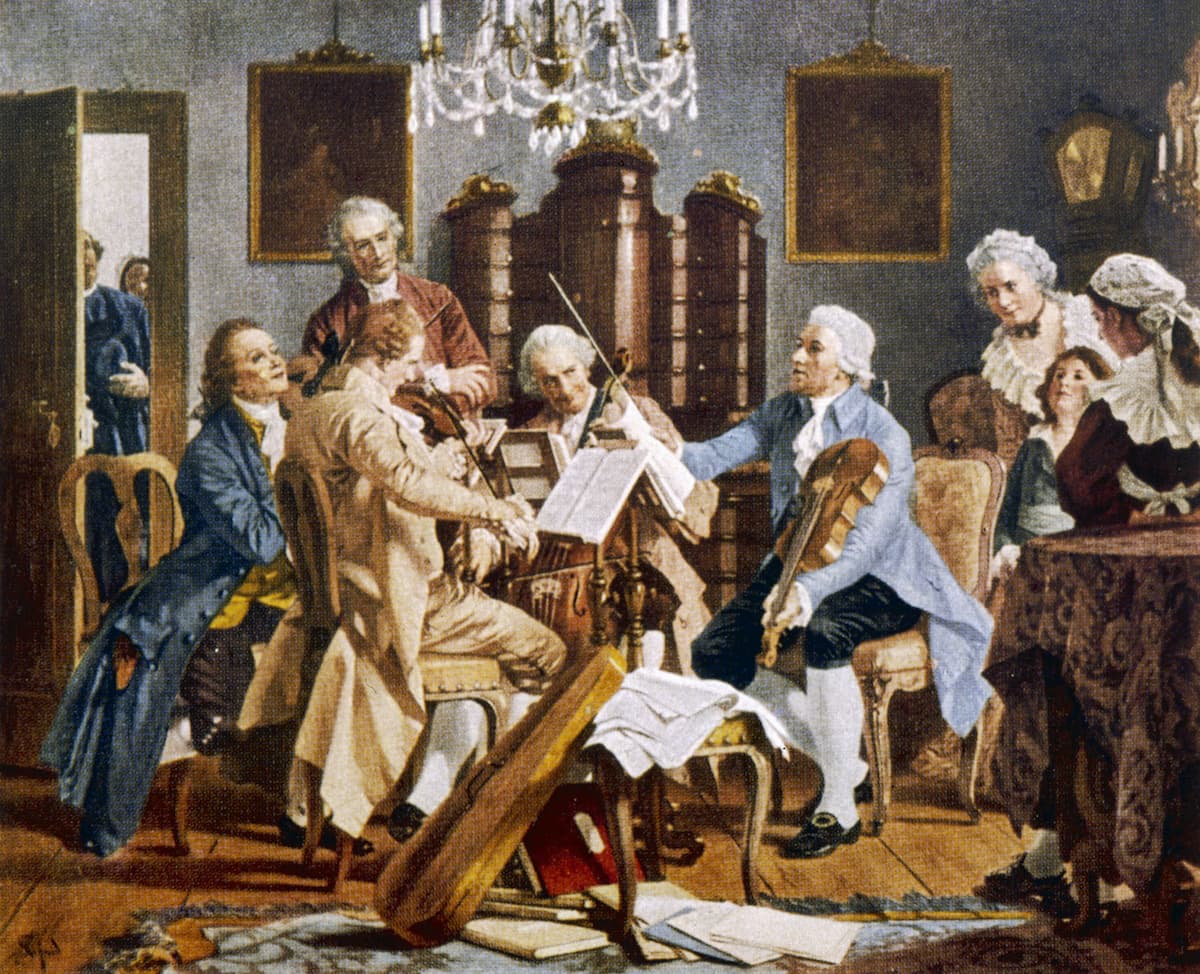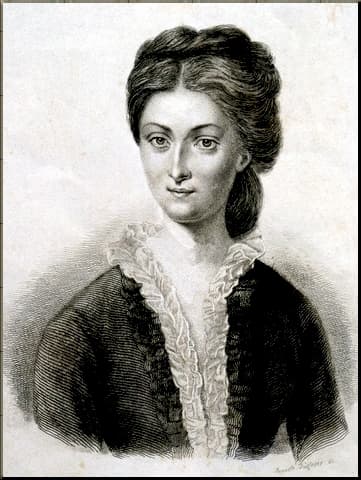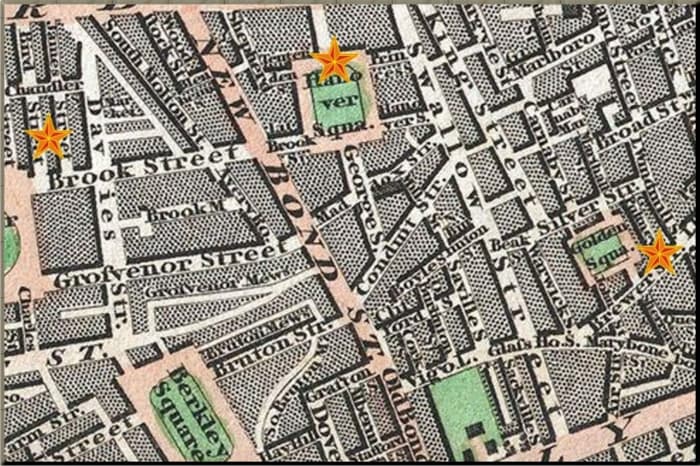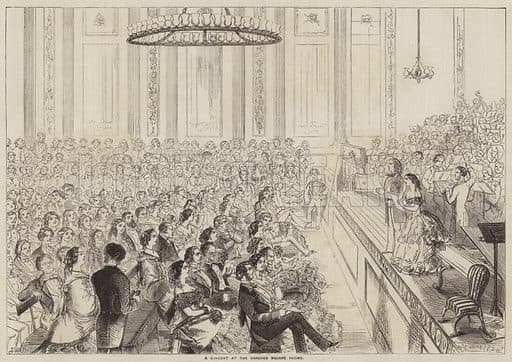During his two London visits, Joseph Haydn was treated like royalty. As one of the most celebrated composers in Europe, he led highly successful concerts and composed a number of his best-known works, including his last twelve symphonies. With a good deal of spare time on his hands, Haydn traveled extensively and greatly expanded his social circle. In August 1791, for example, he stayed on the estate of Nathaniel Brassey, a banker, in Hertfordshire. By mid-September he was back in London; on 5 November he attended an official banquet given by the newly installed Lord Mayor. On 24–5 November he stayed at Oatlands, a property of the Duke of York, who the previous day had been married to a daughter of the King of Prussia; the new duchess became one of his most loyal patrons.

Joseph Haydn conducting a string quartet
During his time in England, Haydn kept a personal diary called the “London Notebooks.” He recorded personal observations, scraps of poetry, Latin aphorisms, addresses and descriptions of places he visited, everyday gossip, and various anecdotes.
Joseph Haydn: Symphony No. 100 in G Major, “Military” (London Philharmonic Orchestra; Georg Solti, cond.)
As the Haydn biographer Albert Christoph Dies discovered, the “London Notebooks” also contained a couple of dozen letters in the English language. When Dies interviewed Haydn in his old age, the composer smiled and said “These letters are from an English widow in London who loved me; although she was getting on in age, she was still a beautiful and charming woman and I would have married her very easily if I had been free at the time.”

Rebecca Schroeter
At that time, Haydn was still unhappily married to Anna Haydn, and the widow in question turns out to be Rebecca (Scott) Schroeter, an amateur musician and widow of the German composer Johann Samuel Schroeter. She lived in some comfort at No. 6 James Street, Buckingham Gate and she was looking for lessons from Haydn. “Mrs. Schroeter presents her compliments to Mr. Haydn, and informs him, she has just returned to town, and will be very happy to see him whenever it is convenient for him to give her a lesson.” Haydn accepted the invitation, and the “London Notebooks” contains 22 letters from Mrs. Schroeter to Haydn. These letters, however, are not preserved in the originals, but in copies made by Hayden.
Joseph Haydn: Keyboard Trio No. 24 in D Major (Beaux Arts Trio)
Rebecca was the daughter of a wealthy Scottish businessman living in London, and the family engaged Johann Schroeter as Rebecca’s music teacher. They fell in love, and against the wishes of her parents—who offered Johann a good deal of money to abandon the relationship—they got married. Once widowed, and in a curious repeat of history, Rebecca once again fell in love with her music teacher.

Map of London 1806 showing Rebecca Schroeter’s house in Hanover Square and Haydn’s rented lodgings
On 7 March 1792 Rebecca wrote to Franz Joseph, “My Dear. I was extremely sorry to part with you so suddenly last Night, our conversation was particularly interesting and I had a thousand things to say to you, my heart WAS and is full of TENDERNESS for you, but no language can express HALF the LOVE, and AFFECTION I feel for you, you are DEARER to me EVERY DAY of my life. … Oh how earnestly I wish to see you, I hope you will come to me tomorrow. I shall be happy to see you both in the Morning and the Evening. God Bless you my love, my thoughts, and best wishes ever accompany you, and I always am with the most sincere and invariable regard.”
Joseph Haydn: Keyboard Trio No. 25 in G Major “Gypsy Rondo” (Martha Argerich, piano; Renaud Capuçon, violin; Gautier Capuçon, cello)
Rebecca Schroeter was highly supportive of Haydn’s career, frequently telling him how much she appreciated his music. She writes on 19 April 1792, “My Dear, I was extremely sorry to hear this morning that you were indisposed, I am told you worked five hours at your Study’s yesterday, indeed MY Dear Love, I am afraid it will hurt you. Why should you who have already produced so many WONDERFUL and CHARMING compositions, still fatigue yourself with such close application.”

Concert at Hanover Square Room
The passionate affair continued until Haydn’s departure from England in 1792. Biographers were surprised that a love affair between the famous Haydn and a lady of London Society somehow managed to escape the gossip paparazzi of the day. It must have been conducted with a good deal of discretion, and Rebecca probably asked Haydn to return her letters prompting the composers to make copies. When Haydn returned to England in 1794 he rented lodgings a mere 10-minute walk from Schroeter’s residence, and it is believed that they continued their relationship. Shortly before Haydn departed permanently for his home in Austria in 1795, he wrote a set of three piano trios for Mrs. Schroeter. Although they would not see each other again after 1795, they surely remained friends and probably in touch.
For more of the best in classical music, sign up to our E-Newsletter
Joseph Haydn: Keyboard Trio No. 26 in F-sharp minor (Beaux Arts Trio)
